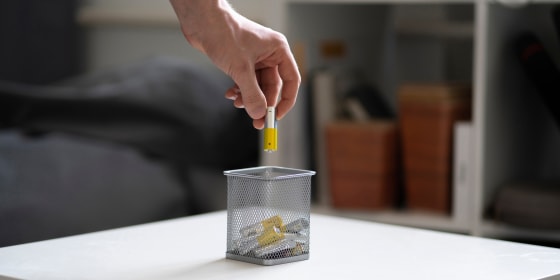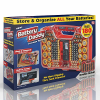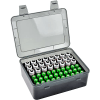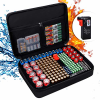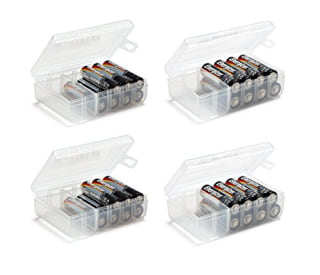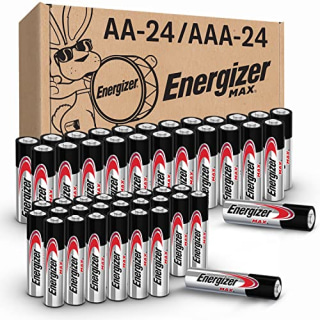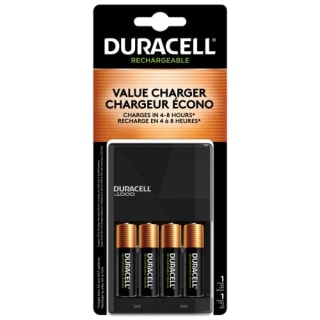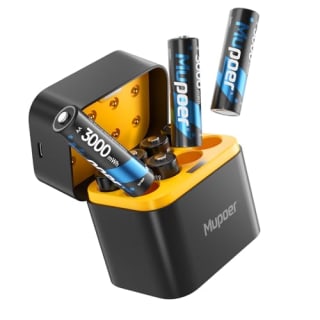We don’t always have the answers, but we have some people on speed dial who do — which is why we present to you our FYI series where we have experts explain if lip balm is actually bad, how often you should wash your hair and more.
Many of us get through countless batteries throughout the year, using them to power our TV remotes, children’s toys, game controllers and small appliances. While batteries are a ubiquitous part of modern life, it’s not always clear how we should store them in a way that’s safe and sustainable.
From AA to AAA, C to D, 9V to 23A, it’s crucial to know how to store disposable batteries, including what to do with them when they no longer work. In this guide, you’ll find expert advice from those in the battery industry on where to keep batteries, ideal temperatures to prevent degradation and how long they can sit idle in a cupboard before you have to take action — as well as the best batteries and battery storage solutions we’ve found.
SKIP AHEAD What battery types are there? | Best battery storage solutions | The best long-lasting batteries | How to safely dispose of batteries | Why trust NBC Select?
What battery types are there?
When it comes to powering a flashlight, TV remote or small toy — there are a few key battery types you’re likely to encounter.
Battery size: The main factor in choosing a battery is its size. Small electronics will require a specific size such as AA, AAA, C, D, button cell, 9V or 23A. These range from cylindrical batteries to thin, circular discs and larger, rectangular models. But even among those sizes, the technology underpinning the battery can vary a lot.
Alkaline batteries: are one of the most common types, offering a longer shelf life (5-10 years) and higher voltage than zinc-based batteries — though the latter may still be suitable for devices with low power requirements.
Lithium batteries: are pricier than their alkaline counterparts, but are known to last longer (up to 20 years) and can handle a much wider range of temperatures (-40℉ to 140℉, according to Batteries Plus). Lithium batteries also require less frequent disposal because of their long-lasting charge, meaning you send fewer batteries to landfill each year.
Rechargeable batteries: sidestep the e-waste issues surrounding single-use batteries. They generally rely on lithium-ion technology or nickel-metal hybrids.
Best battery storage solutions
Best for storing various battery types: Ontel Battery Daddy
- Two-sided storage
- Charge tester included
- Plastic latch
This Ontel Battery Daddy organizer can store and protect up to 150 batteries, across a variety of different battery sizes and types: 58 AA, 68 AAA, 4 9-Volt, 8 C, 8 D, & 8 Button Cells. This extensive storage solution also comes with a ‘battery tester’ to check the charge remaining in each battery, while the case handle makes it easy to move this compact box around. It also has a 4.8/5 Amazon rating across over 2,000 reviews, though a small number of users cite a faulty latching mechanism, so we’d recommend taking care when handling.
Best for AA / AAA: Fullcase Battery Storage
- Decent size
- Affordable
- Limited to AA/AAA
This Fullcase battery organizer only caters to AA and AAA, but can hold a total of 54 individual batteries from the two most common sizes. It’s made from a heavy-duty plastic, and clearly separates each battery to prevent them from coming in contact with each other. It has a 4.6/5 Amazon rating across 950 reviews. It also comes in gray, brown and white colorways.
Best for battery protection: Engpow Battery organizer
- Fireproof and waterproof
- Holds 220+ batteries
- Limited to AA/AAA
This Engpow battery organizer is made of silicone-coated fiberglass, making it able to withstand temperatures of up to 2000℉ — so if you end up in a house fire, your collection of batteries won’t explode and make it any worse. The box comes with two zippered pockets, and is able to store 66 AA, 56 AAA, 10 C, 10 D, 12 9-Volt, 15AAAA, and 48 Button cells, for over 220 batteries total. It has a 4.6/5 Amazon rating across over 2,800 reviews.
Best minimal storage: GlossyEnd Battery Storage Box
- See-through case
- Limited space
This affordable plastic storage solution from GlossyEnd includes four separate boxes for storing AA and AAA batteries. The see-through case makes it easy to see what’s inside, and the sizing is ideal if you only have a handful of batteries to worry about. However, space is limited, and the batteries are in close contact even if the ends are not technically touching. It has a 4.6/5 Amazon rating across over 5,000 reviews.
Best long lasting batteries
Best for multiple sizes: Energizer 48-pack AA / AAA Batteries
- Mix of sizes
- 10 year shelf life
- Not rechargable
If you need a large quantity of commonly-used battery sizes, this 48-pack from Energizer gives you an even split of AA and AAA batteries. Energizer Max batteries are the brand’s longest lasting model with a 10 year shelf life. They also have a “leak resistant construction” to reduce the chance of leakage, according to the brand
Best for rechargeable batteries: Duracell Ion Speed Charger
- Rechargeable
- Comes with charger
- Only four AA batteries
I personally use Duracell’s rechargeable AA batteries for powering my TV remote and game console controllers. They are reusable, long-lasting options that reduce the e-waste from your home. This particular package includes Duracell’s dedicated battery charger and four pre-charged AA batteries — though the charger also works with AAA models and batteries from other brands.
Best compact case: Mupoer rechargeable lithium batteries with charger
- Lithium ion
- Charging storage case
- Lesser known brand
Unlike the Duracell charger above, this compact case works as a handy storage solution for up to eight AA batteries, with the option to use it to charge the batteries when they’re not in use. The closed-box design ensures that the batteries are kept safe from the elements, and the lithium ion batteries should last longer than NiMH (nickel-metal hybrid) alternatives.
How to safely dispose of batteries
Storing batteries is all well and good until you need to dispose of a battery safely. To get a sense of best practice of battery disposal, we spoke to David Klanecky, CEO of Cirba Solutions, which specializes in end-to-end battery recycling.
Klanecky says that “You should recycle all battery types since it is a more eco-friendly option, even if your community allows you to dispose of alkaline batteries in the regular trash. You can store these batteries in a non-conductive container, such as plastic or cardboard, to prevent any sparks. Keep them stored safely until you are ready to dispose of them properly.”
Klanecky adds that rechargeable batteries, “should never be placed in your trash as they contain heavy metals that can be hazardous to the environment. Rechargeable batteries can and should be recycled. To recycle them, cover the battery terminals with non-conductive clear tape before placing them in a recycling container or dropping them off at a recycling location.”
It’s important to use the correct disposal method to stop batteries from going to landfill, where hazardous substances can leak back into the environment.
Klanecky tells us that “Batteries disposed of in landfills can pose a fire risk due to chemical reactions, short circuits and potential leaks, especially lithium-ion batteries that come from devices like cell phones and laptops. Batteries that end up in landfills may corrode and decay, releasing dangerous chemicals into our soil, water sources and even the air.”
Meet our experts
At NBC Select, we work with experts who have specialized knowledge and authority based on relevant training and/or experience. We also take steps to ensure all expert advice and recommendations are made independently and without undisclosed financial conflicts of interest.
- Nate Wade is the Merchandise Manager at Batteries Plus, working across flashlights, power equipment, solar panels and portable power stations.
- David Klanecky is the CEO of Cirba Solutions, a leader in EV (electric vehicle) and end-to-end battery recycling.
Why trust NBC Select?
I have worked as a gadget reporter since 2017, covering the latest developments in consumer hardware, from TVs and headphones to smart speakers and VR headsets. I previously worked as the News & Features Editor at TechRadar and now freelance for NBC Select, Healthline and The Independent.
Catch up on NBC Select’s in-depth coverage of personal finance, tech and tools, wellness and more, and follow us on Facebook, Instagram, Twitter and TikTok to stay up to date.
